Before protein became the “it” nutrient for everyone, it was primarily recognized as essential for athletes and bodybuilders who rely on it to build muscle. While consuming large quantities of egg whites and chicken may be an option for some people, protein powders offer a simple and more convenient way to increase protein intake.
Finding the best protein powder for muscle gain, however, isn’t so easy. Our team of experts tested over 24 of the best protein powders, looking at multiple factors like effectiveness, safety, taste, and price, to find the top protein powder for muscle building. Here’s our list of recommendations, as well as an informative review of each one, to help you find a protein powder that fits your goals.
Editor’s choice: Transparent Labs Whey Protein Isolate
Transparent Labs Whey Protein Isolate earns our pick as editor’s choice thanks to its impressive nutrient profile and clean ingredients. With 28 grams of protein and 1 gram of fat per serving, no artificial sweeteners, and third-party testing, our team believes Transparent Labs stands out as a high-quality protein powder that can support muscle gain.
Medical disclaimer: This article is intended for educational and informational purposes only. It is not intended as a substitute for medical advice. For health advice, contact a licensed healthcare provider.
Our picks for the best protein powder for muscle gain
- Best for men: Transparent Labs Whey Protein Isolate
- Best for female muscle gain: Legion Athletics Whey+
- Best whey: Sports Research Whey Protein
- Best for beginners: Nutricost Grass-Fed Whey Protein Isolate
- Best for fat loss: Gainful Build Muscle Customized Protein Powder
- Best vegan: Ka’Chava
- Best organic: Nutricost Organic Whey Protein Powder
Compare protein powder for muscle gain
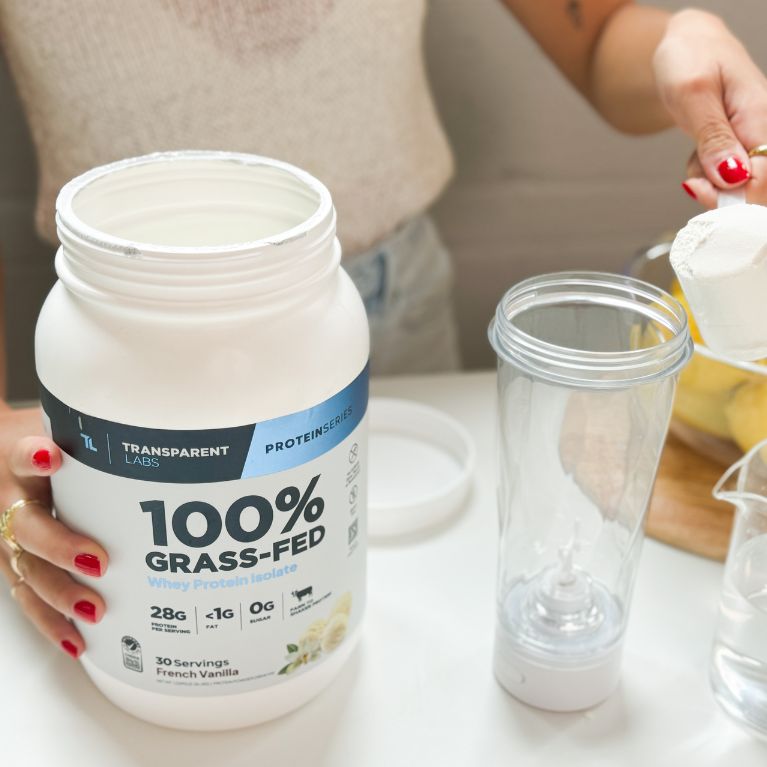
|
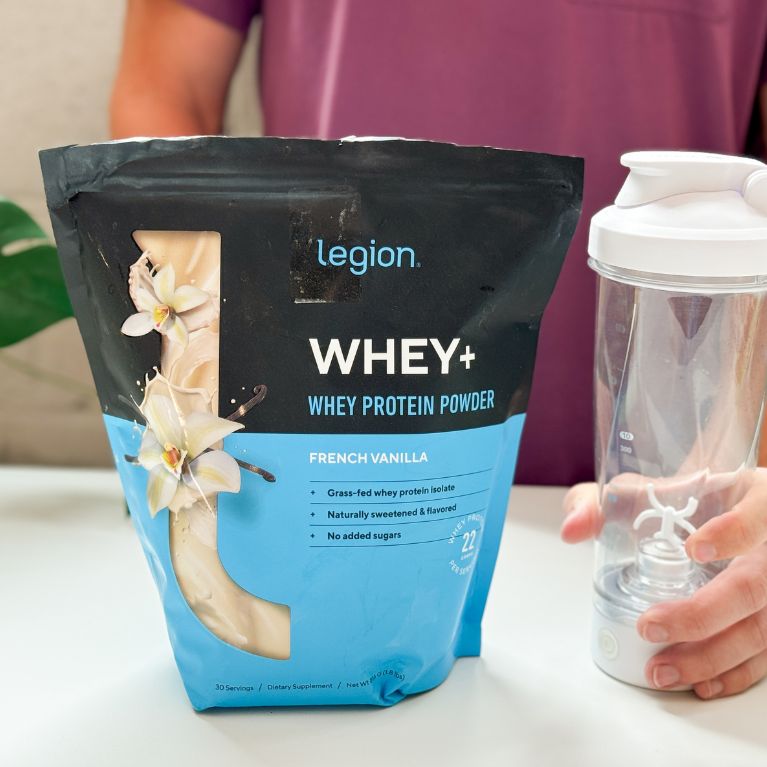
|
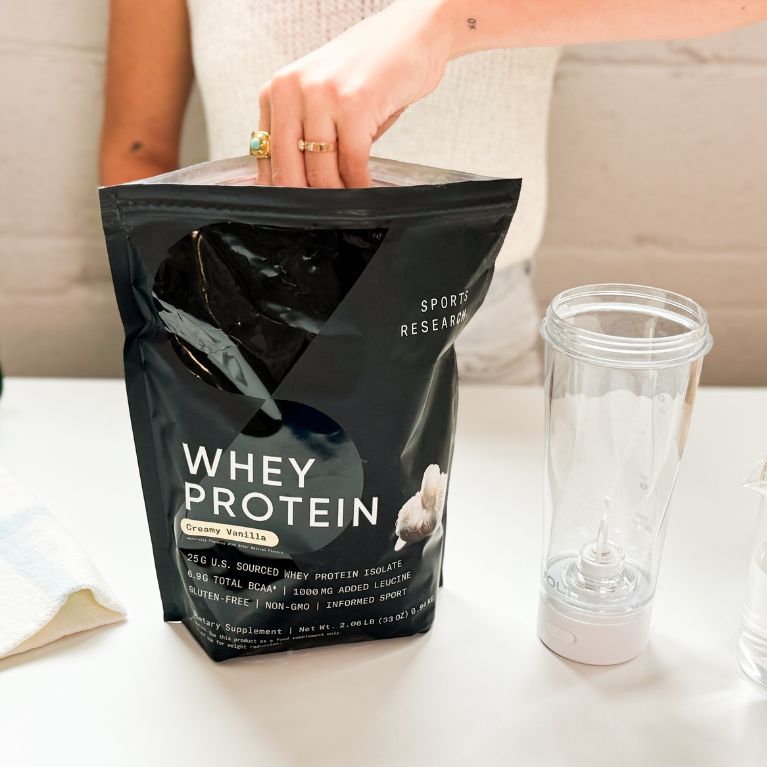
|
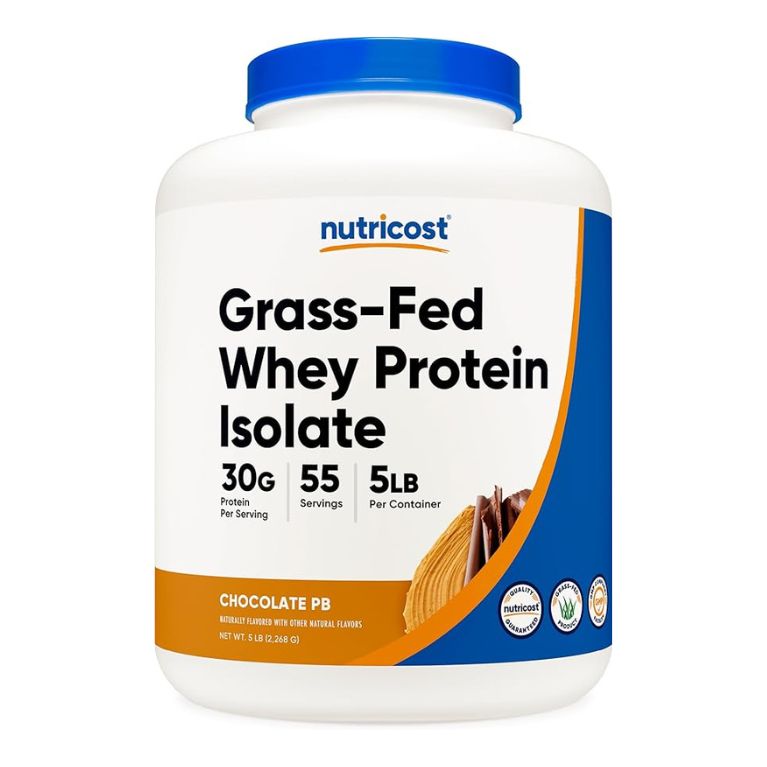
|
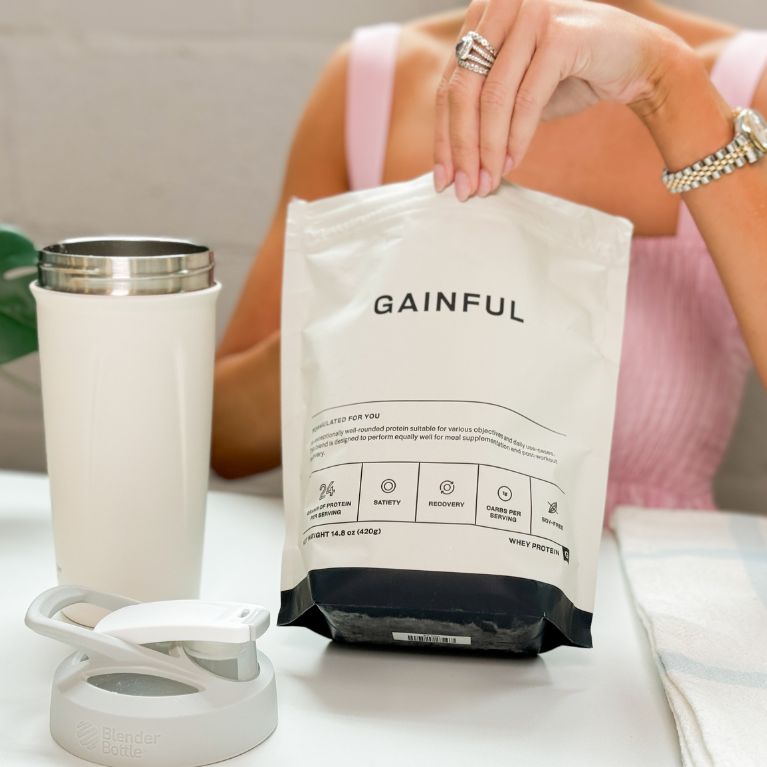
|
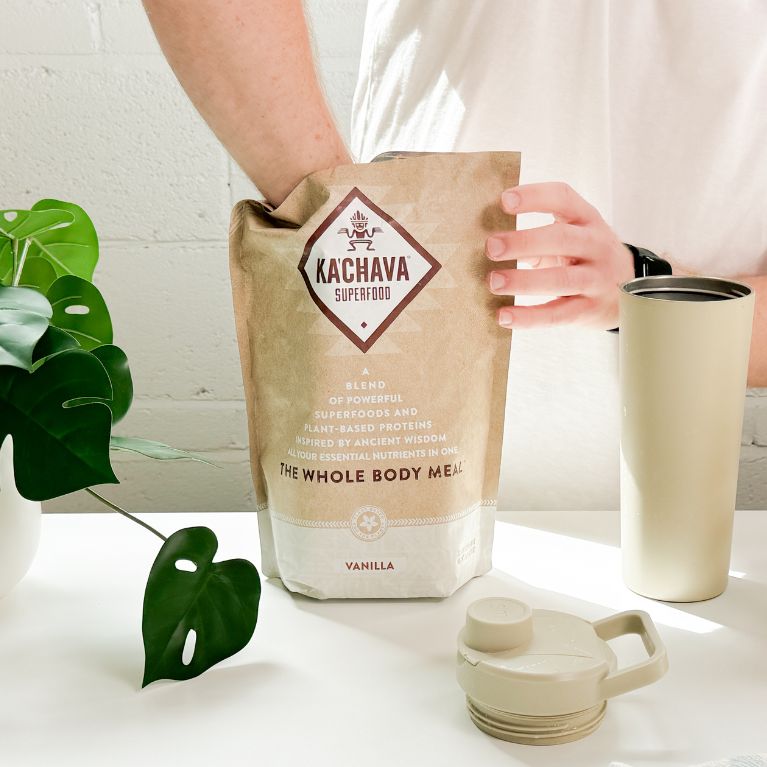
|
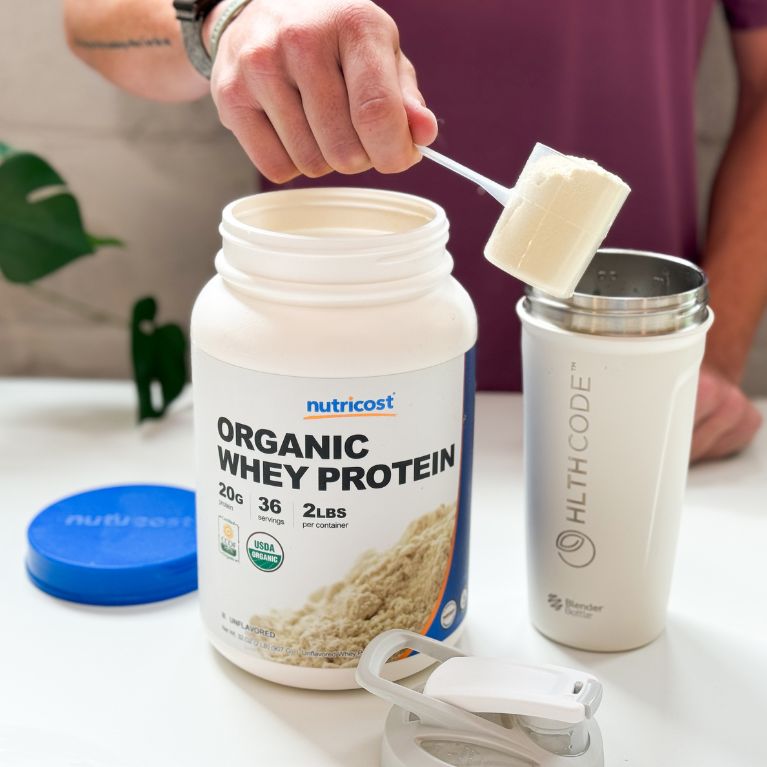
|
|
| Transparent Labs Whey Protein Isolate | Legion Athletics Whey+ | Sports Research Whey Protein | Nutricost Grass-Fed Whey Protein Isolate | Gainful Build Muscle Customized Protein Powder | Ka’Chava | Nutricost Organic Whey Protein Powder | |
| Rating | |||||||
| Cost per serving | $2.00 | $2 | $1.03 | $1.49 | $3.21 | $4.66 | $1.32 |
| Servings per container | 30 | 30 | 60-63 | 55 | 14 | 15 | 36 |
| Protein type | Grass-fed whey protein isolate | Grass-fed whey protein isolate | Whey protein isolate | Grass-fed whey protein isolate | Whey protein isolate, whey protein concentrate; Organic pea protein powder, organic brown rice protein | Yellow pea protein, organic whole grain brown rice protein, organic sacha inchi, organic amaranth, organic quinoa | Organic whey protein concentrate |
| Flavors | 15 | 16 | 2 | 4 | 5 | 3 | |
How to choose the best protein powder for muscle gain
Choosing the best protein powder for muscle gain depends on multiple factors, like your goals, exercise routine, and personal preferences. Consider the following when looking for a protein powder to support muscle growth:
Protein source
One of the first things to consider is whether you want an animal-based or plant-based protein. Both types provide the complete protein you need for muscle gain and the one best suited for you depends on your food preferences as well as food allergies and sensitivities.
Animal-based proteins include whey and casein, while plant-based proteins include pea, soy, brown rice, and plant blends (pea and brown rice), among others.
Health needs and fitness goals
Your personal health needs and fitness goals also determine the best protein powder for you. A protein supplement that provides all the essential amino acids, especially leucine, necessary for muscle protein synthesis is key. But the makeup of your supplement choice may depend on whether you want to lose or maintain body weight or gain muscle.
Nutrition profile
Nutrition profile ties into your health needs and fitness goals. Carefully examine the supplements nutrition facts label. A good protein powder for muscle gain should provide 20 to 40 grams of high-quality protein per serving. (1)
Protein powders usually have some carbs and fat. The amount of carbs, fat, and protein in the supplement affects total calories. Choose protein powder that supplies the nutrition you need to meet your goals.
List of ingredients
Protein powders may contain additional ingredients beyond your preferred protein. It’s important to look at this list to check for sweeteners like stevia and sucralose, additives such as fiber and digestive enzymes, and other ingredients like glutamine and creatine.
The added ingredients may affect taste, tolerance, and effectiveness.
The list of ingredients may also include fillers, preservatives, or artificial flavors. It’s always best to choose protein powders with fewer ingredients to reduce risk of unwanted side effects like stomach upset or allergic reactions.
Safety
Look for protein powders that are third-party tested, meaning the supplement was evaluated by an independent lab for quality and purity. Supplements may display testing information on their website or the label.
Cost
Protein powders come in a range for prices. When selecting the best protein powder for muscle gain, you want one that fits your budget and supports your goals.
Taste
Consistency is the key to meeting health goals. If protein powder provides the nutrition boost you need to build muscle, then you need to consistently use it. If you don’t like the taste or texture of your protein shake, you won’t get the benefits.
Best protein powder for muscle gain for men: Transparent Labs Whey Protein Isolate
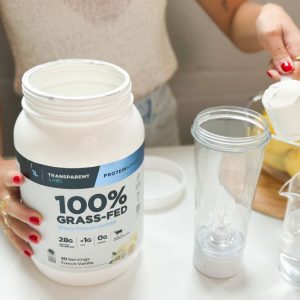

Key product features
What you should know
Transparent Labs Whey Protein Isolate boasts 28 grams of high-quality protein with up to 2.5 grams of fat and 1-3 grams of carbs, perfect for men who want to bulk up but limit fat gain.
- Our product testers found this protein powder tasty and filling, but some remarked that the powder didn’t dissolve well in water.
- Transparent Labs Whey Protein Isolate retails for $2 a serving, which is about the standard market price for protein powders.
- This whey protein powder may be perfect for men who are hitting the weights hard, but lacking in protein in their diet.
- Transparent Labs Whey Protein Isolate has very little lactose, so it’s easier to digest.
Best protein powder for female muscle gain: Legion Athletics Whey+
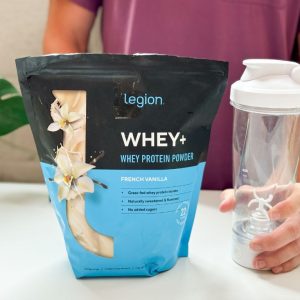

Key product features
What you should know
Legion Athletics Whey+ is a high-protein supplement that’s low in calories, fat, and carbs, providing the balanced nutrition women need to build muscle. Plus, it comes in 16 flavors to satisfy a variety of tastes.
- Our product testers rated the Dutch chocolate flavor a 5 out of 5 for taste.
- At $2 per serving, Legion Athletics Whey+ is similarly priced to other options on the market. Our team believes it’s a good value for the protein quality and nutrition profile it provides.
- Legion Athletics Whey+ is a good choice for women looking for a clean, high-quality protein powder they can take before their workout to build lean muscle and improve body composition.
Best whey protein powder for muscle gain: Sports Research Whey Protein
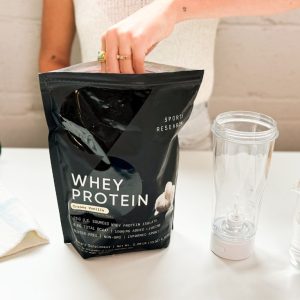

Key product features
What you should know
Sports Research Whey Protein contains all the amino acids in the right amounts to stimulate muscle protein synthesis, including 25 grams of protein, 6.9 grams of branched-chain amino acids (BCAAs), and 1 gram of leucine.
- The amount of leucine in Sports Research Whey Protein maximizes muscle protein synthesis.
- At $1.03 per serving, Sports Research Whey Protein falls below the average market price for protein powders and is a good value for muscle gain given its stellar amino acid profile.
- Sports Research Whey Protein is a great choice for hard-core strength-trainers looking for an effective protein powder to support muscle repair and growth after an intense workout.
- The protein powder is an excellent source of vitamin D, and iron for the chocolate flavor.
- Sports Research Whey Protein keeps carbs low by using two artificial sweeteners for flavor.
Best protein powder for muscle gain for beginners: Nutricost Grass-Fed Whey Protein Isolate
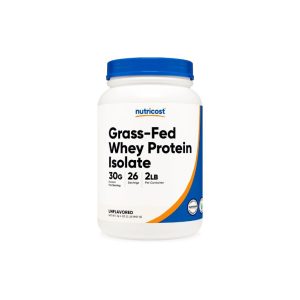

Key product features
What you should know
Nutricost Grass-Fed Whey Protein Isolate provides 30 grams of protein in a form that’s easily digested, absorbed, and utilized by your muscles. It’s easy to mix, available in four delicious flavors, and affordable, making it great for beginners.
- At only 130-150 calories, Nutricost Grass-Fed Whey Protein Isolate offers 30 grams of protein with only 1 gram of fat and 1-4 grams of carbohydrates.
- At $1.49 per serving, this protein powder costs a little less than the average market price.
- With its high protein to calorie ratio, Nutricost Grass-Fed Whey Protein Isolate is a good choice for people who need more protein to maximize muscle gains when bulking up, while limiting fat gains.
Best protein powder for muscle gain and fat loss: Gainful Build Muscle Customized Protein Powder
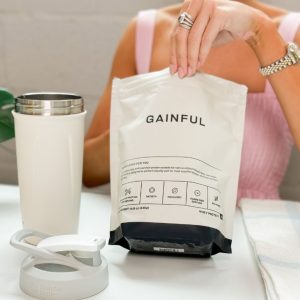

Key product features
What you should know
Gainful Build Muscle Customized Protein Powder is a personalized protein powder that allows you to choose your base protein—whey or plant—to build muscle, providing 19 to 26 grams of protein per serving. They also offer flavor boosters, so you can drink a new flavor each day.
- Our product testers liked the customization aspect of this protein powder and the ability to control its flavor.
- Gainful Customized Protein Powder is more expensive than the average market price for protein powders, at $3.21 per serving, but the ability to customize your own supplement makes it a good value.
- This may be a great protein powder for those on a weight-loss journey who need a calorie-controlled source of protein that can help them lose unwanted fat while they build muscle.
- You get access to registered dietitians for guidance when you sign up for a subscription.
Best vegan protein powder for muscle gain: Ka’Chava
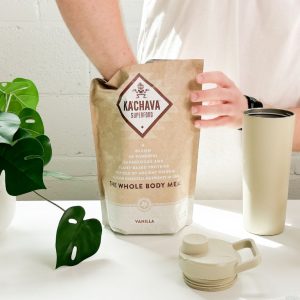

Key product features
What you should know
Ka’Chava is a plant-based meal replacement protein powder with a good balance of macronutrients to support muscle building. The nutrient-rich shake is also an excellent source of vitamins, minerals, and antioxidants.
- Our product testers liked the taste, texture, and solubility of Ka’Chava.
- Ka’Chava is a premium protein powder priced at $4.66 a serving, priced more than $2.00 above the average price for protein powders.
- Ka’Chava is a higher calorie protein powder and a great choice for strength-training vegans and hard gainers who need a boost in calories to make suitable gains in muscle.
- One of our testers thought the vegan protein shake was a bit too pricey and not worth buying again.
Best organic protein powder for muscle gain: Nutricost Organic Whey Protein
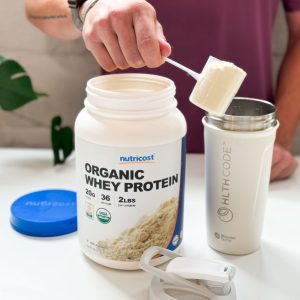

Key product features
What you should know
Nutricost Organic Whey Protein Powder is a clean protein powder with a short ingredient list consisting of organic whey protein concentrate. The supplement provides 20 grams of high-quality protein with very little fat or carbs and only 100-150 calories in every serving.
- This high-protein supplement gets 80% of calories from a complete protein.
- At $1.32 per serving, Nutricost Organic Whey Protein Powder falls below the average market price and is a good value for an organic supplement.
- This is a good protein powder choice for environmentally conscious exercisers who need an easy and clean protein boost after their workout.
How we scored protein powders for muscle gain
Finding the right supplement that meets health goals and delivers on promised claims requires time and research. On top of that, you need to consider product safety and price.
Dedicated to helping you find the best protein powder for muscle gain, we do the leg work for you. Our team tested, evaluated, and fact-checked dozens of protein powders on the market, taking many key factors into consideration, including effectiveness, quality, safety, and price, looking for supplements that rank high in several key areas to create our list of recommendations. Learn more about our whey protein powder scoring methodology and plant-based protein powder methodology here.
We used the following criteria to score each protein powder:
Protein source—40%
The protein source is important because it affects the product’s digestibility, nutrient profile, and environmental impact. We consider the origin of the protein to ensure it meets vegan standards and provides a high-quality, sustainable option.
Here’s what we look for:
- Whey
- Casein
- Soy
- Pea
- Brown rice
- Hemp
- Lentil
- Chia
- Pumpkin Seed
- Blend
Complete protein—20%
Whether the protein is complete is crucial for determining if it provides all nine essential amino acids needed for muscle repair and overall health. We consider this to ensure that the product can serve as a reliable, sole protein source without requiring additional supplementation.
Macronutrient calories per serving—15%
The balance of macronutrients per serving is important for managing energy levels, weight, and overall nutrition. We consider these calories to evaluate if the product supports specific dietary goals, such as high-protein or low-carb diets.
Our factors in this rating include:
- Calories from protein
- Calories from carbs
- Calories from fats
Total protein per serving—15%
The amount of protein per serving is a key factor in determining the product’s effectiveness in meeting daily protein needs.
Our factors in this rating include:
- 20 grams of protein or less per serving
- 21 to 30 grams of protein per serving
- Over 30 grams of protein per serving
Price per gram of protein—5%
Understanding the cost efficiency is important for those who want to manage their budget while meeting their nutritional needs. We consider the price per gram of protein to compare the value of different products.
These are the ranges we consider:
- $0.30 to $0.50 per gram
- $0.60 to $0.80 per gram
- $0.90+ per gram
Sweeteners—5%
Sweeteners play a significant role in the taste, caloric content, and health impact of the product. We consider the type and amount of sweeteners used to evaluate their impact on flavor, their suitability for low-sugar diets, and any potential health implications.
Here are the common ones we evaluate:
- Sugar
- Dextrose
- Honey, agave
- Stevia
- Maltodextrin
- Erythritol
- Monk fruit
- Sucralose
- Aspartame
- Xylitol, acesulfame
How much protein do I need a day to build muscle?
The amount of protein you need a day to build muscle depends on your physique, workout routine, and ultimate goals. The ISSN says you need to eat enough protein to create a positive nitrogen balance. (1) This means you have an adequate supply of essential amino acids to meet general needs and then a little more to build muscle.
Body weight is used to estimate individual protein needs, and for those who are trying to build or maintain muscle the recommendation is about double the RDA, or 1.2-2.0 g/kg of body weight. (1)
If you need help figuring out your daily protein needs, schedule a consultation with a registered dietitian for personalized guidance.
Potential side effects of using protein powder for muscle gain
While protein powder is generally safe and beneficial for muscle gain when consumed in appropriate amounts, some individuals may experience side effects. Common issues include digestive discomfort, such as bloating, gas, or upset stomach, which is often linked to lactose intolerance in those using whey protein. (34) It’s important to choose a high-quality protein powder and consume it as part of a balanced diet to minimize side effects and support muscle growth effectively, and consult with your doctor before starting any new supplementation.
Other protein powders for muscle gain we tried
When testing the best protein powders for muscle gains, there were many standout options that didn’t make the cut. Here’s why:
- Xwerks Grow Whey Protein Isolate: This product provides a solid 25 grams of protein per serving from grass-fed whey, but some people complain that the stevia sweetener is too sweet and gives them headaches. It also lacks digestive enzymes, which could affect absorption for some users, making it less competitive compared to similarly priced options.
- Thorne Whey Protein Isolate: This product offers 21 grams of protein per scoop, but at $62 for a 30-serving tub, the cost per serving is about $2—higher than many alternatives. Although it meets NSF Certified for Sport standards, which is a plus for athletes, the slightly lower protein content and higher price didn’t position it as a top contender for athletes who need to consume (and purchase) protein powder more regularly for muscle gain.
- Vega Sport Protein: With 30 grams of protein per serving and a blend of pea, pumpkin, and sunflower seed proteins, Vega Sport offers strong plant-based nutrition. However, at $64.99 for 20 servings (about $3.25 per serving), it’s one of the more expensive plant-based options. Additionally, many of our testers said it was very grainy and gritty when mixed, leaving an unenjoyable tasting experience.
FAQs
Does protein powder really help you build muscle?
Protein powder can help you build muscle when combined with a strength-training routine and a well-balanced diet. The protein powder supplies the amino acids your muscles need to repair and build muscles following a workout. Taking protein powder without working out won’t lead to muscle gain. However, it will lead to retaining existing muscle mass, so keeping protein intake higher even when not in a big strength-building phase is still very important.
What’s the best type of protein powder for muscle gain?
The best type of protein for muscle gain is one that provides an adequate supply of essential amino acids and 20 to 40 grams of protein per serving. Protein powders that digest quickly, like whey protein, and contain at least 2-3 grams of L-leucine, the amino acid that initiates muscle protein synthesis, are the most effective at building protein. A plant-based protein that includes pea protein and brown rice protein, however, has a similar amino acid profile as whey protein and can work well at supporting muscle gains.
When is the best time to take protein powder for muscle growth?
Research suggests that consuming most of your daily protein needs around your workout (before and after) can stimulate protein synthesis, helping you gain muscle faster. (35) However, other studies emphasize that what truly matters for muscle growth is hitting your daily protein goal, regardless of timing. (36) As long as you’re meeting your protein needs, following a solid strength training program, and focusing on recovery, you’ll make progress in building muscle.
Is creatine or protein powder better for muscle growth?
Both creatine and protein powder support muscle growth, but they work differently. A quality protein powder, especially those with all essential amino acids like L-leucine, helps meet your protein needs by supporting muscle synthesis. (3) The best creatine supplements, on the other hand, boosts the creatine levels in your muscle cells, which can improve strength and speed up recovery. (37) In the short term, creatine may cause water retention, giving your muscles a fuller appearance. Ultimately, creatine’s ability to enhance recovery and strength can lead to faster muscle gains when combined with proper training.
These statements have not been evaluated by the Food and Drug Administration. These products are not intended to diagnose, treat, cure, or prevent any diseases.
Our experts
Victoria Burgess, Ph.D., CSCS, CISSN
Victoria Burgess earned her Ph.D. in Health and Human Performance from Concordia University Chicago and holds her NSCA CSCS and Certified Sports Nutritionist (CISSN). She is an adjunct professor in the Human Performance and Nutrition department at Concordia University Chicago & Parker University, where she teaches undergraduate, graduate, and doctoral level courses.
Chris Mohr, Ph.D., RD
Dr. Christopher Mohr is an internationally recognized subject matter expert, speaker, and performance coach. He works closely with some of the largest corporations in the world including Deloitte, Delta Airlines, Johnson & Johnson, and more to help busy executives develop the energy to thrive personally and professionally. Chris was a member of the Men’s Health Magazine advisory board for 10 years, co-authored a NY Times Bestseller with LL Cool J, called LL Cool J’s Platinum Workout, and worked as the sports nutritionist for the Cincinnati Bengals and select WWE wrestlers.
Joana Neziri, M.S., NASM CPT
Joana is a writer, editor, and content strategist focusing on nutrition, fitness, and all things health. After earning a master’s degree in business from the University of North Florida, she began a career in research and digital marketing.
Jessica Coulon
Jessica Coulon is a contributing editor and writer for Fortune Recommends™ who specializes in fitness, health, nutrition, and science content. Previously, she was an editor for Popular Mechanics and Bicycling, where she covered pro cycling news, wrote how-to guides, and tested all the latest and greatest bike gear. She was also a regular shoe tester and contributor for Runner’s World. You can often find her skiing or riding her mountain bike, and racing with the F1RE female enduro team.
Kelly Uhler
Kelly has a multifaceted background in elder care, health care, and copywriting. She has worked for organizations such as A Place For Mom and Homecare.com, which gave her the opportunity to work closely with families, providing reliable information to help them make informed decisions about their loved one’s health, safety, and quality of life.

Jill Corleone
Registered Dietitian and Health Writer
About Author
Jill’s life has centered around nutrition and fitness for more than two decades. After earning her bachelor of science in nutrition at New York University in Manhattan, Jill went on to complete her internship at the University of Medicine and Dentistry of New Jersey in Newark.
She spent the early part of her career working as a clinical dietitian with a focus on pediatric nutrition. She then transitioned into management. Jill began her career as a freelance writer in 2007 while working as a clinical nutrition manager in Florida. She became a full-time writer in 2010 after the birth of her first child.
Jill has written for numerous publications, including Verywellfit, Diabetes Self-Management, Huffington Post, Livestrong.com, and SFGate.
References
- Jäger, R., Kerksick, C. M., Campbell, B. I., Cribb, P. J., Wells, S. D., Skwiat, T. M., Purpura, M., Ziegenfuss, T. N., Ferrando, A. A., Arent, S. M., Smith-Ryan, A. E., Stout, J. R., Arciero, P. J., Ormsbee, M. J., Taylor, L. W., Wilborn, C. D., Kalman, D. S., Kreider, R. B., Willoughby, D. S., Hoffman, J. R., … Antonio, J. (2017). International Society of Sports Nutrition Position Stand: protein and exercise. Journal of the International Society of Sports Nutrition, 14, 20. https://doi.org/10.1186/s12970-017-0177-8
- Maden-Wilkinson, T. M., Balshaw, T. G., Massey, G. J., & Folland, J. P. (2020). What makes long-term resistance-trained individuals so strong? A comparison of skeletal muscle morphology, architecture, and joint mechanics. Journal of applied physiology (Bethesda, Md. : 1985), 128(4), 1000–1011. https://doi.org/10.1152/japplphysiol.00224.2019
- A Castro, L. H., S de Araújo, F. H., M Olimpio, M. Y., B de B Primo, R., T Pereira, T., F Lopes, L. A., B S de M Trindade, E., Fernandes, R., & A Oesterreich, S. (2019). Comparative Meta-Analysis of the Effect of Concentrated, Hydrolyzed, and Isolated Whey Protein Supplementation on Body Composition of Physical Activity Practitioners. Nutrients, 11(9), 2047. https://doi.org/10.3390/nu11092047
- Kerksick, C. M., Wilborn, C. D., Roberts, M. D., Smith-Ryan, A., Kleiner, S. M., Jäger, R., Collins, R., Cooke, M., Davis, J. N., Galvan, E., Greenwood, M., Lowery, L. M., Wildman, R., Antonio, J., & Kreider, R. B. (2018). ISSN exercise & sports nutrition review update: research & recommendations. Journal of the International Society of Sports Nutrition, 15(1), 38. https://doi.org/10.1186/s12970-018-0242-y
- Veniamakis, E., Kaplanis, G., Voulgaris, P., & Nikolaidis, P. T. (2022). Effects of Sodium Intake on Health and Performance in Endurance and Ultra-Endurance Sports. International journal of environmental research and public health, 19(6), 3651. https://doi.org/10.3390/ijerph19063651
- Dietary Guidelines for Americans. Top 10 things you need to know about the Dietary Guidelines for Americans, 2020-2025. Accessed May 18, 2024. https://www.dietaryguidelines.gov/2020-2025-dietary-guidelines-online-materials/top-10-things-you-need-know
- Wohlgemuth, K. J., Arieta, L. R., Brewer, G. J., Hoselton, A. L., Gould, L. M., & Smith-Ryan, A. E. (2021). Sex differences and considerations for female specific nutritional strategies: a narrative review. Journal of the International Society of Sports Nutrition, 18(1), 27. https://doi.org/10.1186/s12970-021-00422-8
- Bartolomei, S., Grillone, G., Di Michele, R., & Cortesi, M. (2021). A Comparison between Male and Female Athletes in Relative Strength and Power Performances. Journal of functional morphology and kinesiology, 6(1), 17. https://doi.org/10.3390/jfmk6010017
- Bagheri, R., Shakibaee, A., Camera, D. M., Sobhani, V., Ghobadi, H., Nazar, E., Fakhari, H., & Dutheil, F. (2023). Effects of 8 weeks of resistance training in combination with a high protein diet on body composition, muscular performance, and markers of liver and kidney function in untrained older ex-military men. Frontiers in nutrition, 10, 1205310. https://doi.org/10.3389/fnut.2023.1205310
- Amatori, S., Callarelli, C., Gobbi, E., Bertuccioli, A., Donati Zeppa, S., Sisti, D., Rocchi, M. B. L., & Perroni, F. (2023). Going Vegan for the Gain: A Cross-Sectional Study of Vegan Diets in Bodybuilders during Different Preparation Phases. International journal of environmental research and public health, 20(6), 5187. https://doi.org/10.3390/ijerph20065187
- Kerksick, C. M., Arent, S., Schoenfeld, B. J., Stout, J. R., Campbell, B., Wilborn, C. D., … Antonio, J. (2017). International society of sports nutrition position stand: nutrient timing. Journal of the International Society of Sports Nutrition, 14(1). https://doi.org/10.1186/s12970-017-0189-4
- Bakaloudi, D. R., Halloran, A., Rippin, H. L., Oikonomidou, A. C., Dardavesis, T. I., Williams, J., Wickramasinghe, K., Breda, J., & Chourdakis, M. (2021). Intake and adequacy of the vegan diet. A systematic review of the evidence. Clinical nutrition (Edinburgh, Scotland), 40(5), 3503–3521. https://doi.org/10.1016/j.clnu.2020.11.035
- Saldanha, L. G., Dwyer, J. T., Hardy, C. J., & MacKay, D. J. (2023). Perspectives on the Use of Proprietary Blends in Dietary Supplements. The Journal of Nutrition, 153(5), 1305–1308. https://doi.org/10.1016/j.tjnut.2023.03.035
- Moon, J., & Koh, G. (2020). Clinical Evidence and Mechanisms of High-Protein Diet-Induced Weight Loss. Journal of obesity & metabolic syndrome, 29(3), 166–173. https://doi.org/10.7570/jomes20028
- Stephan van Vliet, Nicholas A Burd, Luc JC van Loon. The Skeletal Muscle Anabolic Response to Plant- versus Animal-Based Protein Consumption. The Journal of Nutrition, Volume 145, Issue 9, 2015. Pages 1981-1991. ISSN 0022-3166. https://doi.org/10.3945/jn.114.204305
- Chapman-Lopez, T. J., & Koh, Y. (2022). The Effects of Medium-Chain Triglyceride Oil Supplementation on Endurance Performance and Substrate Utilization in Healthy Populations: A Systematic Review. Journal of obesity & metabolic syndrome, 31(3), 217–229. https://doi.org/10.7570/jomes22028
- Harvard T.H. Chan School of Public Health. Low-calorie sweeteners. Accessed May 9, 2024. https://www.hsph.harvard.edu/nutritionsource/healthy-drinks/artificial-sweeteners/
- World Health Organization. Lecithin. Accessed May 9, 2024. https://apps.who.int/food-additives-contaminants-jecfa-database/Home/Chemical/1477
- Office of Dietary Supplements. Dietary supplements: What you need to know. Accessed May 7, 2024. https://ods.od.nih.gov/factsheets/WYNTK-Consumer/
- Iraki, J., Fitschen, P., Espinar, S., & Helms, E. (2019). Nutrition Recommendations for Bodybuilders in the Off-Season: A Narrative Review. Sports (Basel, Switzerland), 7(7), 154. https://doi.org/10.3390/sports7070154
- Quigley E. M. M. (2019). Prebiotics and Probiotics in Digestive Health. Clinical gastroenterology and hepatology : the official clinical practice journal of the American Gastroenterological Association, 17(2), 333–344. https://doi.org/10.1016/j.cgh.2018.09.028
- Liang, Y., Chen, Y., Yang, F., Jensen, J., Gao, R., Yi, L., & Qiu, J. (2022). Effects of carbohydrate and protein supplement strategies on endurance capacity and muscle damage of endurance runners: A double blind, controlled crossover trial. Journal of the International Society of Sports Nutrition, 19(1), 623–637. https://doi.org/10.1080/15502783.2022.2131460
- Naderi, A., de Oliveira, E. P., Ziegenfuss, T. N., & Willems, M. T. (2016). Timing, Optimal Dose and Intake Duration of Dietary Supplements with Evidence-Based Use in Sports Nutrition. Journal of exercise nutrition & biochemistry, 20(4), 1–12. https://doi.org/10.20463/jenb.2016.0031
- Antonio, J., Candow, D. G., Forbes, S. C., Gualano, B., Jagim, A. R., Kreider, R. B., Rawson, E. S., Smith-Ryan, A. E., VanDusseldorp, T. A., Willoughby, D. S., & Ziegenfuss, T. N. (2021). Common questions and misconceptions about creatine supplementation: what does the scientific evidence really show?. Journal of the International Society of Sports Nutrition, 18(1), 13. https://doi.org/10.1186/s12970-021-00412-w
- Gorissen, S. H. M., Crombag, J. J. R., Senden, J. M. G., Waterval, W. A. H., Bierau, J., Verdijk, L. B., & van Loon, L. J. C. (2018). Protein content and amino acid composition of commercially available plant-based protein isolates. Amino acids, 50(12), 1685–1695. https://doi.org/10.1007/s00726-018-2640-5
- Martínez, Y., Li, X., Liu, G., Bin, P., Yan, W., Más, D., Valdivié, M., Hu, C. A., Ren, W., & Yin, Y. (2017). The role of methionine on metabolism, oxidative stress, and diseases. Amino acids, 49(12), 2091–2098. https://doi.org/10.1007/s00726-017-2494-2
- Durante W. (2020). Amino Acids in Circulatory Function and Health. Advances in experimental medicine and biology, 1265, 39–56. https://doi.org/10.1007/978-3-030-45328-2_3
- Tinguely, D., Gross, J., & Kosinski, C. (2021). Efficacy of Ketogenic Diets on Type 2 Diabetes: a Systematic Review. Current diabetes reports, 21(9), 32. https://doi.org/10.1007/s11892-021-01399-z
- Oh, R., Gilani, B., & Uppaluri, K. R. (2023). Low-Carbohydrate Diet. In StatPearls. StatPearls Publishing.
- Frampton, J., Murphy, K. G., Frost, G., & Chambers, E. S. (2021). Higher dietary fibre intake is associated with increased skeletal muscle mass and strength in adults aged 40 years and older. Journal of cachexia, sarcopenia and muscle, 12(6), 2134–2144. https://doi.org/10.1002/jcsm.12820
- Hatami, E., Ghalishourani, S. S., Najafgholizadeh, A., Pourmasoumi, M., Hadi, A., Clark, C. C. T., Assaroudi, M., Salehi-Sahlabadi, A., Joukar, F., & Mansour-Ghanaei, F. (2021). The effect of spirulina on type 2 diabetes: a systematic review and meta-analysis. Journal of diabetes and metabolic disorders, 20(1), 883–892. https://doi.org/10.1007/s40200-021-00760-z
- Chaouachi, M., Gautier, S., Carnot, Y., Guillemot, P., Pincemail, J., Moison, Y., Collin, T., Groussard, C., & Vincent, S. (2022). Spirulina supplementation prevents exercise-induced lipid peroxidation, inflammation and skeletal muscle damage in elite rugby players. Journal of human nutrition and dietetics : the official journal of the British Dietetic Association, 35(6), 1151–1163. https://doi.org/10.1111/jhn.13014
- Church, D. D., Hirsch, K. R., Park, S., Kim, I. Y., Gwin, J. A., Pasiakos, S. M., Wolfe, R. R., & Ferrando, A. A. (2020). Essential Amino Acids and Protein Synthesis: Insights into Maximizing the Muscle and Whole-Body Response to Feeding. Nutrients, 12(12), 3717. https://doi.org/10.3390/nu12123717
- Malik TF, Panuganti KK. Lactose Intolerance. [Updated 2023 Apr 17]. In: StatPearls [Internet]. Treasure Island (FL): StatPearls Publishing; 2024 Jan-. Available from: https://www.ncbi.nlm.nih.gov/books/NBK532285/
- Cintineo HP, Arent MA, Antonio J, Arent SM. Effects of Protein Supplementation on Performance and Recovery in Resistance and Endurance Training. Front Nutr. 2018 Sep 11;5:83. doi: 10.3389/fnut.2018.00083. PMID: 30255023; PMCID: PMC6142015. https://www.ncbi.nlm.nih.gov/pmc/articles/PMC6142015/
- Lak M, Bagheri R, Ghobadi H, Campbell B, Wong A, Shahrbaf A, Shariatzadeh M and Dutheil F (2024) Timing matters? The effects of two different timing of high protein diets on body composition, muscular performance, and biochemical markers in resistance-trained males. Front. Nutr. 11:1397090. doi: 10.3389/fnut.2024.1397090 https://www.frontiersin.org/journals/nutrition/articles/10.3389/fnut.2024.1397090/full
- Wu SH, Chen KL, Hsu C, Chen HC, Chen JY, Yu SY, Shiu YJ. Creatine Supplementation for Muscle Growth: A Scoping Review of Randomized Clinical Trials from 2012 to 2021. Nutrients. 2022 Mar 16;14(6):1255. doi: 10.3390/nu14061255. PMID: 35334912; PMCID: PMC8949037. https://www.ncbi.nlm.nih.gov/pmc/articles/PMC8949037/
